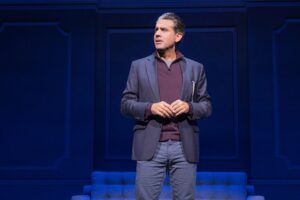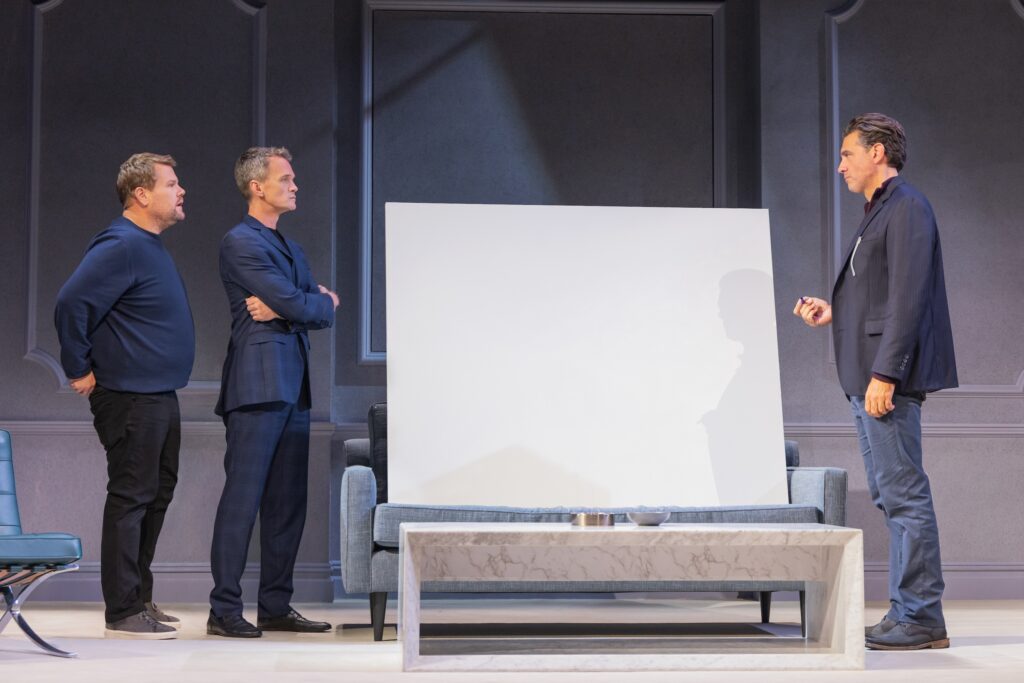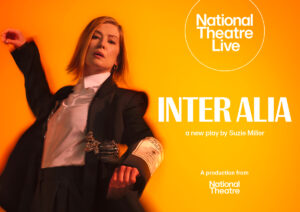Design for Living
BY CHRISTOPHER BYRNE
There are flashpoints in every long-term relationship—whether romantic of platonic. Those are the moments when an unexpected event, response, choice, or opinion can upend the web of assumptions, understandings, and willingness to overlook personal characteristics that seem necessary to sustain an even keel and sail through the years.

When these occur, they may be met with surprise, anger, as sense that “I never knew that,” or “They’ve changed.” These moments can either pass, or they can fracture the connection. What all these moments have in common is the realization that people and relationships change over time. Yet, particularly with long-term, platonic friends, part of us always stays entrenched in whatever the “best times” were, and those powerful memories can keep a part of that friendship stuck in the past…and be at odds with the dynamic nature of time and the changes it inevitably causes in all of us. At the same time, we want those friends to know us, admire us, as we are now—that we’ve made something of ourselves over all those years.
Just such a moment—and the dramatic fallout—is the centerpiece of Yasmina Reza’s play Art, now getting a top-notch revival at The Music Box Theatre with a stellar cast that features Bobby Cannavale, James Corden, and Neil Patrick Harris.
The triggering event that threatens the 25-year relationship between the three men is that Serge (Harris) has spent $300,000 on a painting that is little more than a large, blank, white canvas from a famous painter Antti. He is thrilled with the acquisition. Whether he truly appreciates the piece or what the purchase says about him, is an open question. Serge is a dermatologist with connoisseur aspirations, and passionately insists that there is more to the work than just a blank canvas. Marc (Cannavale) doesn’t share Serge’s enthusiasm and can’t support that expenditure that Marc feels was performative and certainly strained Sege’s finances. Marc calls the piece “garbage,” and Serge questions Marc’s appreciation of art. Marc has seen himself as an aesthete with knowledge and taste in art and somewhat of a mentor to Serge’s growing art knowledge. (Marc’s aesthetic tends more to the “classical,” so Serge’s sudden passion for modernism feels like a betrayal.) Serge’s purchase of the painting disrupts the established power dynamic between the men, and Marc is both hurt and furious. Yvan (Corden) on the other hand, doesn’t take umbrage at Serge’s purchase and seems content for him to have made it, despite Marc trying to whip Yvan up into a level of outrage that matches his.

As noted, the canvas in question is large, blank, and white. It recalls Robert Rauschenberg’s series of white paintings from 1951. Rauschenberg believed that people would project themselves into the paintings—and literally see what they wanted to.
The revival is definitely timely, as greater attention is being paid to the lack of close, platonic, male friendships, particularly for men in middle age and beyond, in contemporary culture. The blank painting is a perfect metaphor for the relationship of the three men. They have seen in each other what they wanted to for years, based on memory, nostalgia, and history. What the ensuing arguments make clear is that these men don’t really know each other and they’ve harbored resentments and judgments that they’ve kept hidden for the sake of the relationships. These are the guys who meet for dinner and movies and, it seems, never reach much beneath the surface. For all their interactions, the men are essentially isolated and deeply needy. What they need would be possible through their relationships, but they have years of behavior and assumptions and private hurts that make that seemingly impossible. That would make the play a tragedy except that, as often happens, flashpoints can be a catalyst for healing. So, after all the verbal pyrotechnics, hurts bared, cruelty, and realizations that the people you think are closest to you do not share your worldview, the play ends on a cautiously hopeful note.
The script, which was translated from the French by Christopher Hampton, sparkles. Under Scott Ellis’ direction, the play moves at a very satisfying clip that still manages to find the space to dig below the facile surface.

Not surprisingly, the three actors are outstanding in their roles; they’ve been perfectly cast. Harris as Serge is the quietest of the three but he masters the subtext, subtly conveying the character’s excitement and vulnerability. Serge is more fragile than he might let on as he yearns to have his own identity as an art patron separate from Marc. Cannavale is bombastic and overwhelming as Marc, but he, too, is posturing. Cannavale fills the role with fireworks and nuance that shows perhaps he is not as he presents himself and that the rift with Serge challenges his identity. Corden as Yvan makes a wonderful return to the Broadway stage after his tour-de-force in One Man, Two Guvnors in 2012. His Yvan wants nothing to do with art. He just wants to get through life, struggle with his career, (He’s had to take a job in stationery sales in a company owned by his fiancées uncle to make ends meet.) get through a wedding about which he is ambivalent, and, he hopes, have the support of his two best friends. It is the possible loss of them that challenges Yvan most deeply. His role in the triangle is of the peacemaker, and he only reveals his feeling about the painting under duress. Yvan is balancing on a very thin edge, Corden’s whirlwind monologue about the crushing pressures of family, work, and his torment as a man lost in the midst of it all is both hilarious and a direct counterpoint to the cerebral argument about the value of a work of art.
Of course, as so often happens when events inspire eruptions, the conflict was never was about a painting. It’s about that tenuous tightrope of identity, image, and ego and how we can be our authentic selves and be at peace with that. Art asks us to examine who we are without the trappings and performative personas we adapt. Can we still connect? Can we still have value? That is the art in question. It is the art of living honestly—and it’s seldom immediately discernible…or pretty.
Art
Music Box Theatre
239 West 45th Street
Tues-Fri 7 p.m.; Weds, Sat 2 p.m.; Sat 8 p.m.; Sun 3 p.m. (some variation) through December 21.
$74-$621 at Telecharge
100 minutes, no intermission
Photos by Matthew Murphy, provided by the production
Posted: September 29, 2025












This article on *Art* is a real hoot! Pitting a $300,000 blank canvas as the pivot point for a trio of men whose friendships seem stuck in the best times is pure comedic gold. Who doesnt love watching friends get incensed over white paint, especially when it disrupts the established power dynamic? The analysis of these guys projecting their desires onto each other, while harboring secret resentments, is hilariously spot-on. And lets be real, the idea that this drama might actually *heal* them? Give me a break, but I suppose a cautiously hopeful note is the perfect wrap-up for such a chaotic artistic endeavor! The descriptions of the stellar cast navigating this mess are just the cherry on top of this delightful piece.no, i’m not a human 攻略